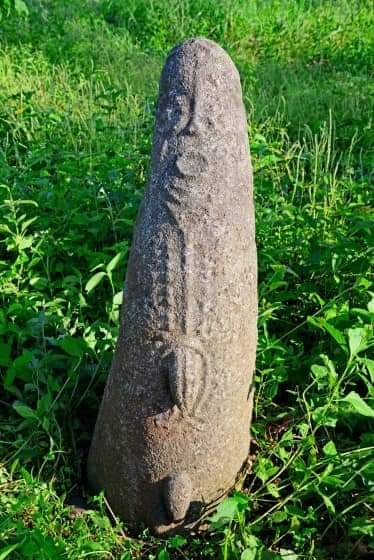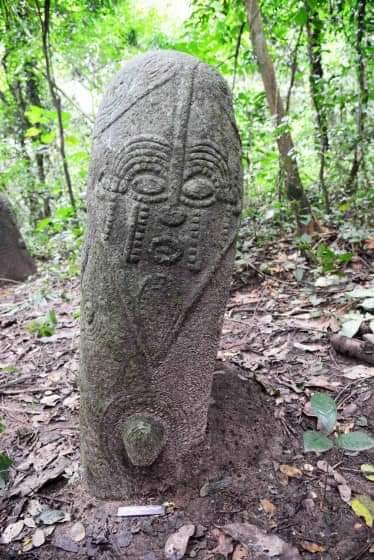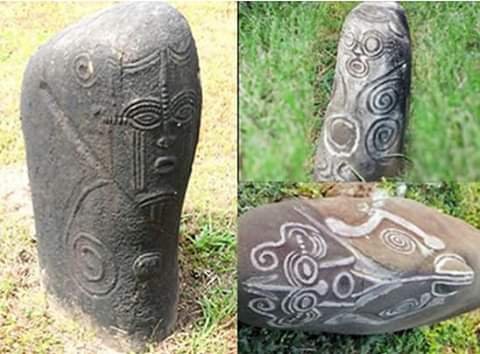The Alok Ikom Stone Monoliths

The heart of Africa is around the foot of Niger; the delta where it lost itself into the Atlantic Ocean. And like a beautiful bride, it has attracted humanity from the dawn of homo sapien. The indelible marks left by early inhabitants of the area confirm that Africa is indeed the cradle of humanity. One of such is the dwarf monolithic stones found in the area now known as Niger delta are called. Here, majority of these stones are carved in hard, medium-textured basaltic rock, a few are carved in sandstone and shelly limestone.
Among the Ejagham people of the Cross River State, there is such reverence and awe accord these stones distributed among over thirty communities in the area and it is calle d Akwanshi/Atal. In each community, the stones are found in circles, sometimes perfect circles, facing each other standing erect, except where they have been tampered with by weather or man. This strongly suggest that the land in which they were erected and now found was earlier considered a forest of some significance like the evil forest. For example, in Etinan and Nabrokpa communities, the stones are found in an area of uncultivated forest outside the villages.
d Akwanshi/Atal. In each community, the stones are found in circles, sometimes perfect circles, facing each other standing erect, except where they have been tampered with by weather or man. This strongly suggest that the land in which they were erected and now found was earlier considered a forest of some significance like the evil forest. For example, in Etinan and Nabrokpa communities, the stones are found in an area of uncultivated forest outside the villages.
However in some other cases, the stones are found in the center of the village or in the central meeting place of the village elders, as in the case of Alok and Agba communities. This proffers a positive view of the stones as some sort of guardian angel or ancestor. Perhaps, the secret lies in the kind of drawings on the stone; since some bear anthropomorphic faces where some are scary and some are of welcoming appearances.
According to some research work done on the site (which can be found on British Museum website) Ikom Monoliths, consisting of around 400-450 engraved erect stones were initially thought to be up to 1500 years old. However, a more recent research has not been able to give a precise date of the marvelous Stone Age arts. More, natural processes such as weathering and human induced destroyer such as theft, vandalism and neglect, have all contributed to reduce the number to be less than 250.
The common features of the monoliths are that they are hewn into the form of a phallus ranging from about three feet in height to about five and half feet and are decorated with carvings of geometric and stylized human features, notably two eyes, an open mouth, a head crowned with rings, a stylized pointed beard, an elaborately marked navel, two decorative hands with five fingers, a nose, various shape of facial marks.
According to another research, the stone monoliths of Alok Ikom bear a form of writing and a complex system of codified information. Although they seem to share the same general features, each stone, like the human finger print, is unique from every other stone in its design and execution. The big question is what were the makers of this stone trying to pass across to us down the ages? The geometric images on the monoliths also suggest that their makers possessed more than a basic knowledge of mathematics, not only because they are geometric, but also because of the obvious implication that there were computations and numbers on the layout of the stones. This is evident of an advance civilization where it is least expected because the psyche of Africans has come under the sledge hammer of western racist and parochial perspective that we are of primitive mind. The Ikom monoliths with their geometric inscriptions, their complexity of design, and the codified symbol could be compared to the rock Arts of Tanzania. The meanings of which, perhaps, are known to only the artists and forever lost.

Wouldn’t you rather pay a visit to these wonder of the south eastern Nigeria in your life time?
References:
1 UNESCO https://whc.unesco.org/en/tentativelists/5173/
- The British Museum
https://africanrockart.britishmuseum.org/country/nigeria/ikom-monoliths%20/